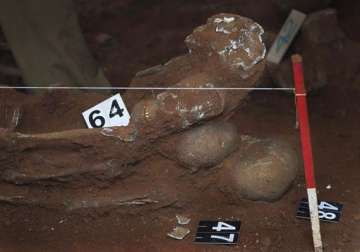Colombo, June 21: Two retired judges and a former Parliament official were appointed on Friday to a Presidential Commission that will investigate a mass grave found last year with 154 bodies, most likely of Marxist rebels killed decades ago.
The commission's chairman is retired Supreme Court judge S.I. Imam, while the other members are retired High Court judge Bandula Atapattu and former Secretary General of Parliament Dhammika Kithulgoda, said Mohan Samaranayake, the spokesman for President Mahinda Rajapaksa.
Construction workers found the grave last December at a state-run hospital in Matale, about 105 km northeast of the capital, Colombo. The skeletons were buried in neat rows, five or six stacked on top of one another.
Mr. Samaranayake said the commission's mandate and the duration of its work would be announced later. The Government had earlier said that the commission's probe will be in addition to the ongoing police investigation.
In March, a judge declared the mass grave a crime scene and said the skulls and bones recovered date back 25 years, strengthening suspicions that they belonged to suspected Marxist rebels killed at the time.
Magistrate Chathurika de Silva told a court in Matale that tests carried out by archaeological and judicial medical officials showed the remains dated to between 1987 and 1990. During that period, thousands of men and women suspected of having ties to the rebels disappeared after being arrested by security forces.
More than 20 people have submitted affidavits to the magistrate court, asking for a proper investigation and saying they suspect the skeletons belong to relatives who disappeared during those years.
When the bodies were found, there were initial claims that they died from an epidemic in the 1940s or in a mudslide. However, hospital authorities did not have any records of bodies buried on the premises.
A Marxist group, the People's Liberation Front, which led two uprisings first in 1971 and again from1987 to 1989 against the government, said the bodies may belong to its members killed by security forces and demanded that the government conduct a full investigation.
The Marxists were mostly rural Sinhalese, the country's majority ethnic community. They complained of economic disparities and said that rural people were denied equal opportunities.
Latest World News
